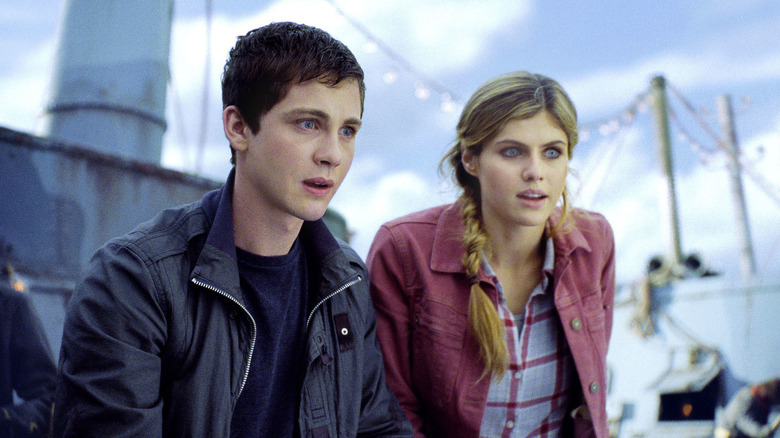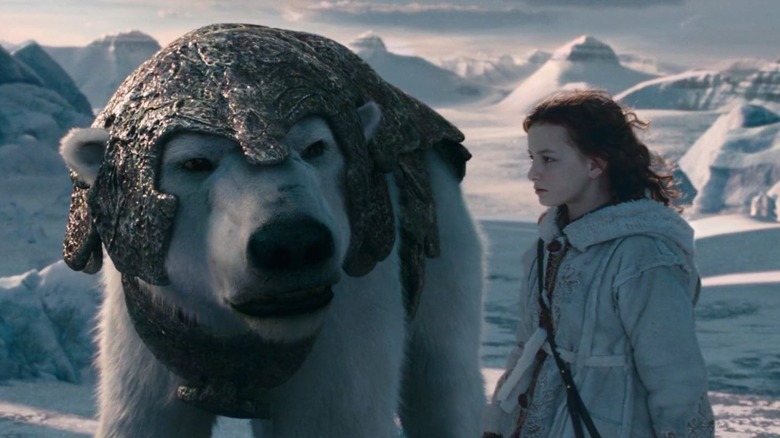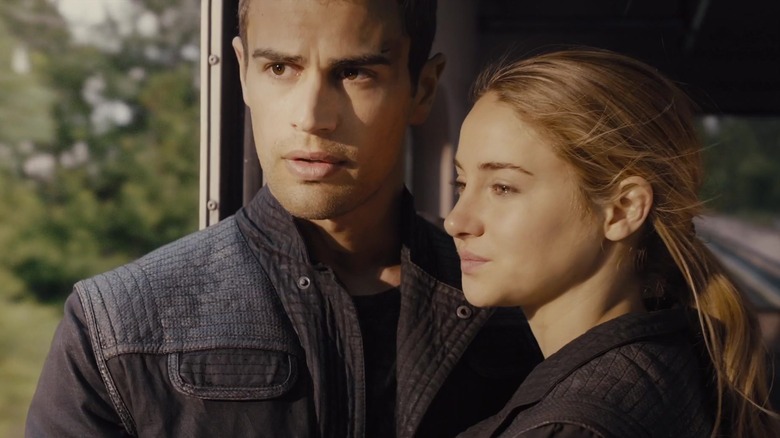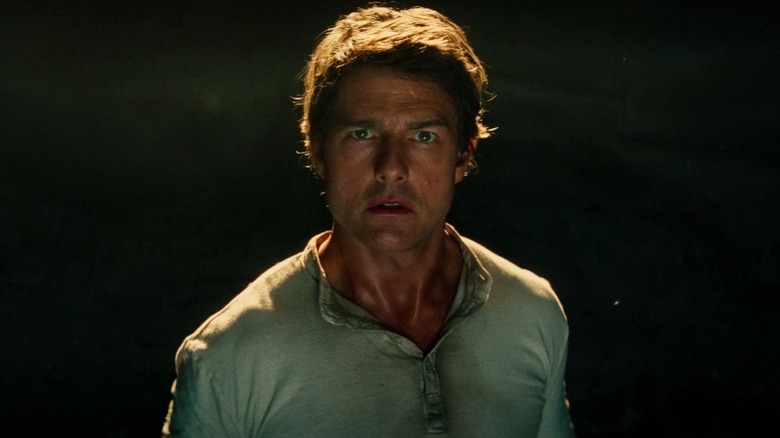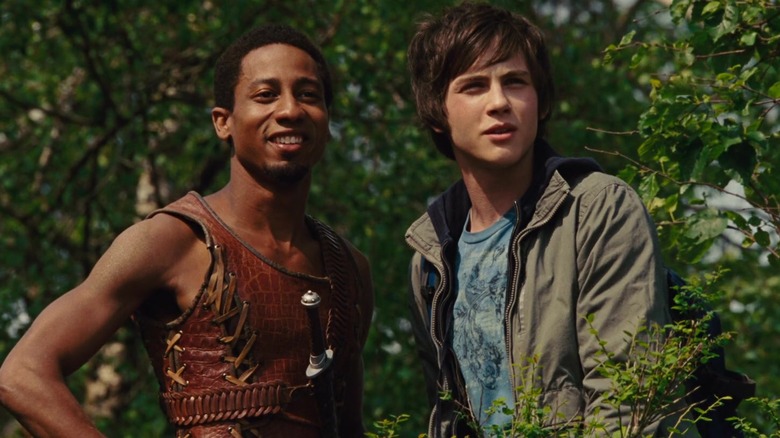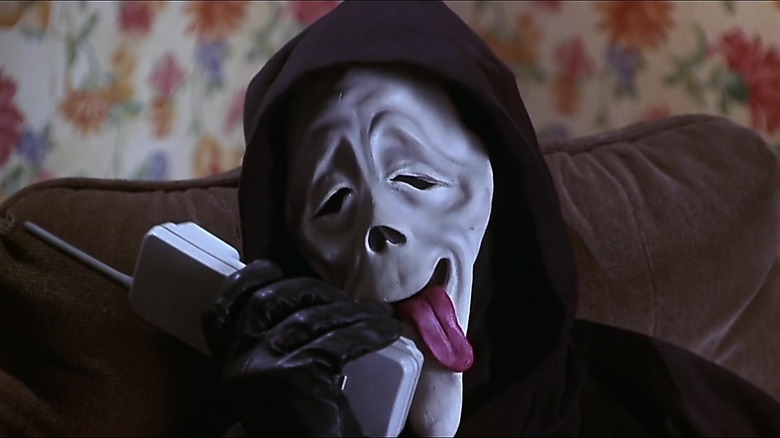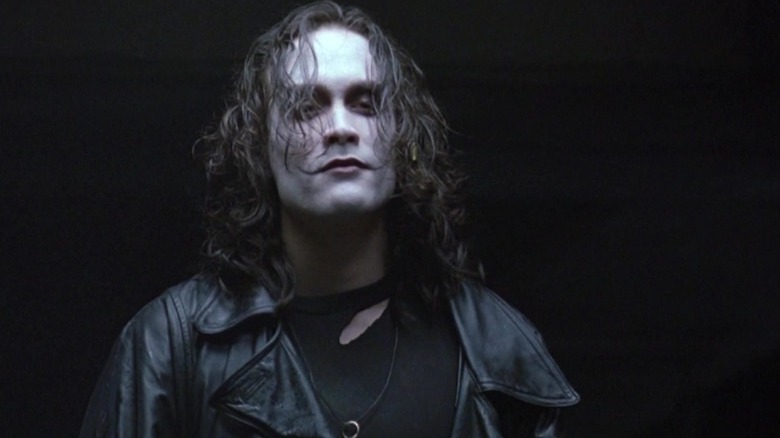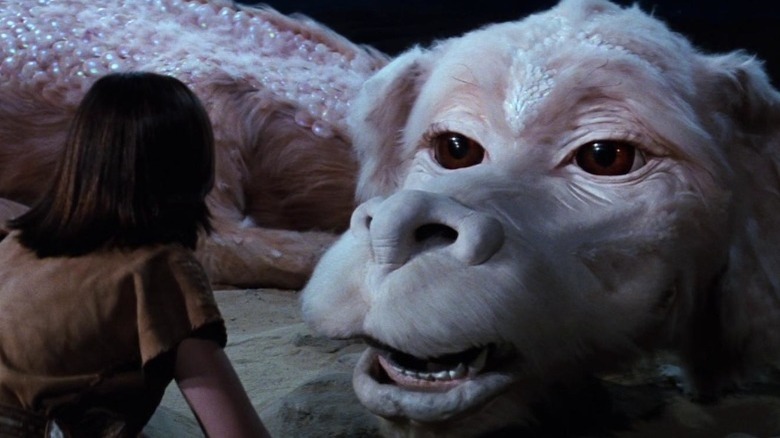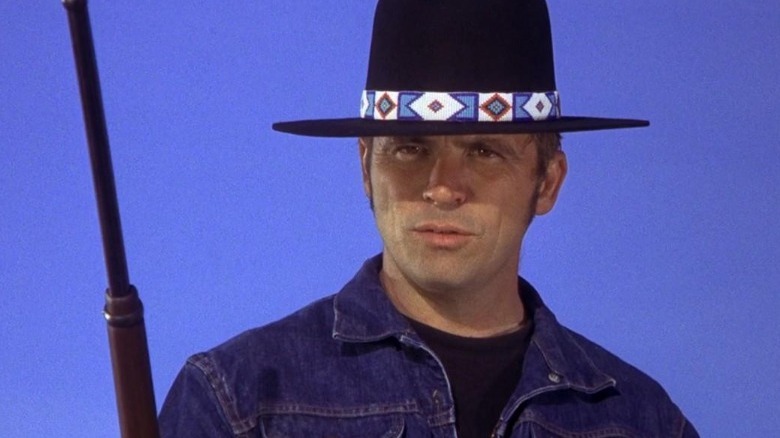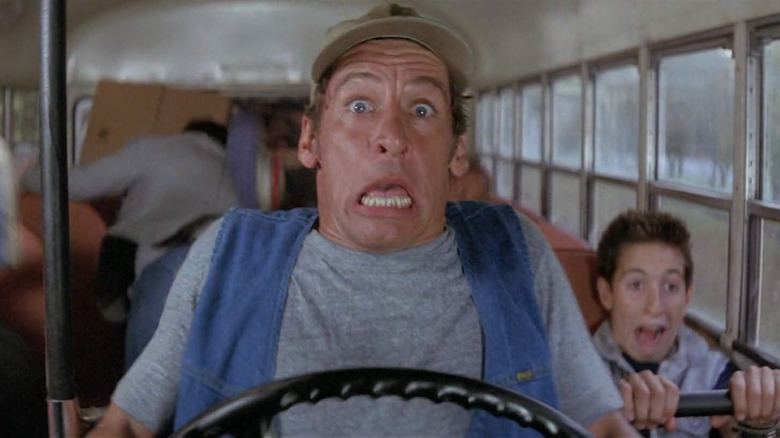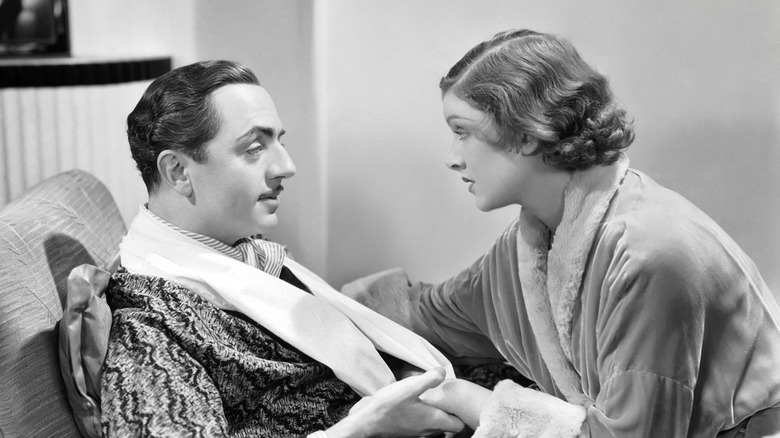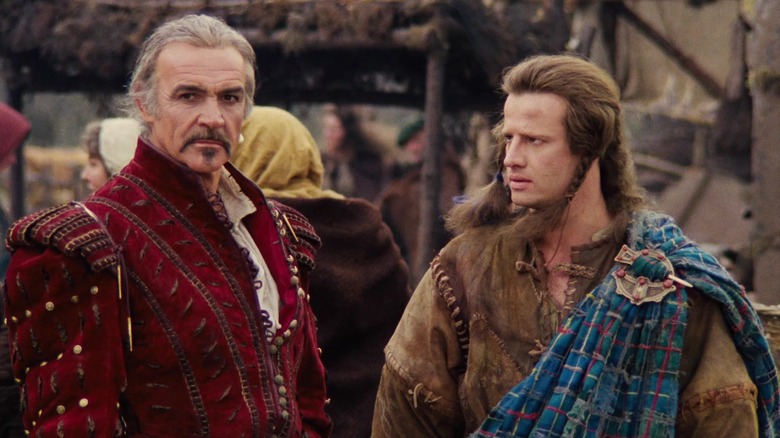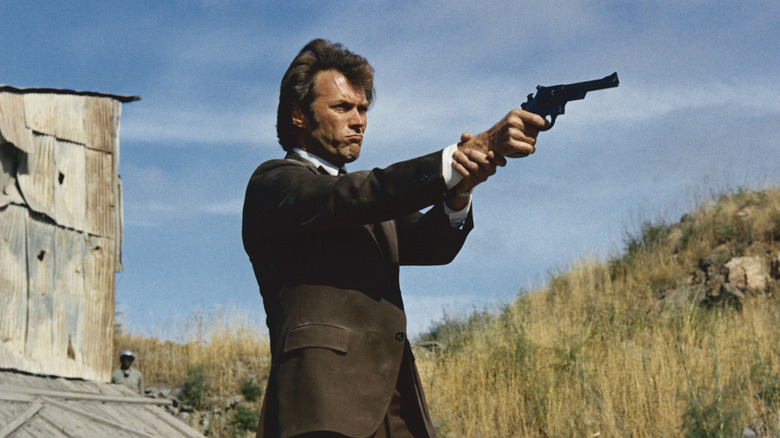Dead And Abandoned Movie Franchises You May Have Forgotten About
Modern moviegoers are more than familiar with the idea of movie franchises. It seems like a new film can't release without it somehow being tied to a larger series or have the potential to spawn numerous sequels. The unmatched success of properties such as the MCU and "Star Wars" means that studios always want to find the next big thing that can be exploited. After all, why make a single film when it's possible to get more money from fans by releasing more of what they like?
Yet, movie franchises are not some new phenomena. Ever since people first started going to the cinema, filmmakers have been crafting stories that feature the same popular characters in new scenarios. It simply makes sense to do that as there's less risk involved in producing movies that are tied to a known brand — but that doesn't mean that every single franchise is a guaranteed success.
In fact, there have been numerous movie franchises over the decades that have been abandoned. Sometimes, the films simply failed to find an audience and were left to die, while others may have run their course as actors and crew moved on to new projects. Whatever the case, these are all film series that have been discarded and might even have been completely forgotten.
The Golden Compass
Directed by Chris Weitz, 2007's "The Golden Compass" is a fantasy adventure film that stars high-profile names such as Daniel Craig, Eva Green, Sam Elliott, and Ian McKellen. Based on Philip Pullman's 1995 novel "Northern Lights," it was intended to be the first of a trilogy of films based on the "His Dark Materials" book series, but no other films were ever released.
The story largely revolves around a group of characters in a futuristic parallel version of Earth where humans have an animal spirit counterpart known as a dæmon. The protagonists set out to discover what a mysterious group known as the Gobblers plan to do with children they have been kidnapping at the behest of the Magisterium — the ruling authority in the world.
New Line Cinema eventually put the two subsequent films on hold. The fact that "The Golden Compass" had underperformed at the box office and had received mixed reviews from critics meant that sequels were unlikely to be greenlit. However, the studio cited the financial effects of the global recession as a major reason rather than the disappointing reception of the first film. A subsequent television adaptation of the novels that aired on BBC and HBO was more warmly received.
The Divergent Series
Like many other movie franchises, "The Divergent Series" is actually an adaptation of novels (these being written by Veronica Roth). The action mainly takes place in a dystopian version of Chicago where humans are strictly divided into one of five groups depending on what their dominant virtue is. The protagonist Tris Prior, played by Shailene Woodley, joins characters played by the likes of Theo James and Zoë Kravitz as she copes with being an outsider and the shocking discovery of a sinister conspiracy at the heart of this post-apocalyptic society.
The first film in the collection, "Divergent," hit cinema screens in 2014, grossing more than $288 million against a budget of $85 million. That success was enough to lead to two sequels arriving over the next two years, despite a rather mixed reception from critics and fans. While the first movie was helmed by Neil Burger, Robert Schwentke took on directing duties for the two sequels. The movies met with criticism and failed to meet financial expectations alongside the significantly increased budgets.
Plans for the second entry in the two-part finale to conclude the story were ultimately shelved, while a possible television spin-off was also canceled. This was most likely a result of the original actors turning down the chance to continue to play their characters in a smaller-budget setting.
The Dark Universe
"The Mummy" series has a long history of remakes and reboots. The Brendan Fraser and Rachel Weisz incarnation of the film that most filmgoers will be familiar with is actually just one in a long line of adaptations of the same story. So it shouldn't have come as a huge surprise in 2017 when Universal Pictures released a new take on the franchise in the form of "The Mummy." Starring Tom Cruise as U.S. soldier Nick Morton, the narrative follows Morton after he inadvertently resurrects an ancient Egyptian princess who was mummified alive.
Estimates suggest that "The Mummy" lost Universal Pictures tens of millions of dollars as reviewers lambasted the film. But the failure of the film had even larger consequences, effectively canceling an entire franchise before it had even managed to properly establish itself. The "Dark Universe" was Universal's answer to the MCU, an interconnected cinematic series built around classic horror films.
A Twitter post teased projects starring Johnny Depp, Javier Bardem, and Russell Crowe, but none of the other projects ever came to fruition. Just a few months after the release of "The Mummy," the studio postponed one of the projects before the franchise was scrapped entirely.
Percy Jackson
Based on Rick Riordan's young adult novel series of the same name, the "Percy Jackson" film series began life in 2010 with the release of "Percy Jackson & the Olympians: The Lightning Thief." This first installment was directed by Chris Columbus, the legendary director behind everything from "Home Alone" and "Mrs. Doubtfire" to "Harry Potter and the Sorcerer's Stone." With such an esteemed name behind the project, there was hope that it would lead to an entire franchise.
Like the novels, the films take place in modern times, where ancient Greek gods like Zeus and Poseidon live alongside humans. Percy Jackson (Logan Lerman) is the demigod son of Poseidon and embarks on a mission to rescue his mother and return Zeus' lightning bolt to prevent an all-out war between the deities. The second entry in the series, "Percy Jackson: Sea of Monsters," arrived three years later in 2013 and sees Percy attempt to reclaim the lost Golden Fleece.
Fans, critics, and even original author Riordan all chastised the filmmakers for deviating significantly from the source material. This may have been part of the reason why the films failed to find much success at the box office and why there have been no attempts to add any extra installments to this movie franchise. However, a new live-action TV series for Disney+ is in the works, with Riordan working closely on the production to ensure it follows the books.
Scary Movie
Parody films have been a part of the Hollywood machine for a long time. In fact, some of the most successful comedies of all time have been parodies. Just look at the likes of "Airplane," "Galaxy Quest," or "Shaun of the Dead" for great examples of the genre that have become beloved comedies in their own right. The "Scary Movie" franchise is one of the more recent parody series, with the first arriving in 2000. Created by Keenen Ivory Wayans, Shawn Wayans, and Marlon Wayans, the movies typically poke fun at tropes within horror films, lampooning properties such as "Scream" and "The Ring."
While none of the entries in the "Scary Movie" series have been critical darlings, the first movie proved to be a huge box office hit grossing more than $270 million against a budget of just $19 million. However, subsequent films have faced dwindling success, failing to match the success of the first movie.
At least part of the reason why the series has remained dormant since 2013 and the release of "Scary Movie 5" could well be because of a dispute between the Wayans brothers and film studio Dimension Films. The brothers have previously spoken about how they felt the franchise was stolen from them and exploited with too many films.
The Crow
Some people may not even be aware of "The Crow" and its sequels, but the 1994 film was one of the first dark and mature superhero films. Based on James O'Barr's comic series, the first entry follows amateur musician Eric Draven as he seeks vengeance on a gang that killed him and his wife-to-be. Resurrected by a supernatural being in the form of a crow, Eric has a number of enhanced abilities and cannot be harmed or killed as his injuries almost instantly heal.
Directed by Alex Proyas, the film starred Brandon Lee as the titular character in what would be the actor's final role, as he died during production. A cult hit, sequels were almost a certainty, but Lee's death meant that each of the subsequent entries — including "The Crow: City of Angels," "The Crow: Salvation," and "The Crow: Wicked Prayer" — over the following 11 years featured different protagonists who take on the Crow persona.
Despite attempts to reboot the series over the years in the form of new movies or television series, "The Crow" has remained off-screen since 2005 and looks no closer to coming back any time soon.
The NeverEnding Story
The 1984 film "The NeverEnding Story" is a fantasy film that was directed and written by Wolfgang Petersen, with Herman Weigel also contributing to the screenplay. It is an adaptation of German author Michael Ende's novel "The Neverending Story," which was first released in 1979. The story follows a young boy called Bastian who finds himself absorbed in a magical book. The mystical land at the center of the story, Fantasia, is being threatened by a mysterious and seemingly malevolent force known only as the Nothing.
"The NeverEnding Story" was not a huge financial success but it did draw plaudits from critics for its imaginative narrative and striking visuals. The first film is now well remembered, but its subsequent sequels are usually not held in the same regard. "The NeverEnding Story II: The Next Chapter" failed to make back its budget, while "The NeverEnding Story III" told a completely original story, although it did use familiar characters from the previous films and the original novel.
Despite the enduring popularity of "The NeverEndingStory" and the trend in Hollywood for remakes and reboots, the series has remained dormant and there is little evidence that it will be returning to the screen in the near future.
Billy Jack
The first installment in what has become known as the "Billy Jack" film series arrived in 1967 in the form of "The Born Losers." This was followed by the 1971 movie "Billy Jack" and then later "The Trial of Billy Jack" and "Billy Jack Goes to Washington." Portrayed by Tom Laughlin, Billy Jack is a heroic half-Navajo Green Beret who protects a community of outcasts and underrepresented students from the local residents and police who want to shut the school down. Jack does everything he can to not only help those in need but safeguard the weak.
As the series progresses, it touches on everything from Native American rights to the effects of the Vietnam War. Jack eventually stands trial for his actions and even enters politics as a senator to continue his mission of fighting for those that others have forgotten. The final installment came in 1977, and plans for a revival in 1985 — that would have been named "The Return of Billy Jack" — were ultimately canceled after Laughlin suffered a serious head injury and production funds ran out before filming could be completed.
Homeward Bound
Officially titled "Homeward Bound: The Incredible Journey," the 1993 adventure film follows a group of two dogs and a cat who find themselves journeying across America when they mistakenly believe they have been abandoned by their owners and are determined to return home. The film is essentially a remake of the earlier 1963 film "The Incredible Journey" which features a similar group of animals and was based on an even earlier novel by Sheila Burnford.
Receiving widespread acclaim from both critics and audiences, "Homeward Bound" was successful enough to warrant a sequel. This second film was released in 1996 under the name "Homeward Bound II: Lost in San Francisco" and sees the same animals traveling through the streets of San Francisco after their family takes a vacation abroad. However, it didn't quite capture the same magic as its predecessor. Following the release of the sequel, which once again starred Michael J. Fox and Sally Field, there have been no other "Homeward Bound" movies.
The Ernest Films
"The Ernest Films" are almost unique in the movie industry. They feature a fictional comedy character by the name of Ernest P. Worrell (Jim Varney) who originally appeared in radio and TV commercials before he was the subject of a number of movies. These began in 1987 with the release of "Ernest Goes to Camp" and continued up until 1998 with the direct-to-video installment "Ernest in the Army."
A popular character throughout the 1980s and 1990s, Ernest was a fast-talking and seemingly invulnerable figure who loved disguising himself as other characters but also often found himself in mishaps. Despite the movies largely failing to resonate with critics, they were commercially successful thanks to low budgets.
Several other entries in the franchise were shelved before filming began, and actor Varney passed away before finishing planned installments. A possible reboot of the series was explored in 2012 under the title "Son of Ernest," but this never came to fruition, and there's been no word about any potential further films since then.
The Thin Man
One of the earliest film franchises in Hollywood, "The Thin Man" was a comedy mystery series that featured two protagonists from Dashiell Hammett's 1934 novel of the same name. Husband and wife duo Nick and Nora Charles find themselves playing detective in various films, and the quick-witted, sophisticated, and occasionally argumentative pairing became something of a trope in detective stories due to the sheer popularity of the couple, spawning a host of copycats.
Played by William Powell and Myrna Loy in all six films between 1934 and 1947, the sleuths would use their understanding of glamorous lifestyles along with an instinct for observing hidden clues to solve cases. The movies featuring the pair are widely seen as classics and the influence of "The Thin Man" series has been important to the detective genre. Yet, very few modern film fans will likely even be aware of who these characters are or what films they were part of, as the franchise has been left abandoned — except for a brief time when Johnny Depp was expected to lead a revival.
Highlander
The "Highlander" franchise is arguably one of the most bizarre movie series in history. Through five live-action films of questionable quality along with numerous television series and animated projects, the series continued from the 1980s all the way up to 2007. The first entry, simply titled "Highlander," saw Christopher Lambert take on the role of Connor MacLeod — an immortal being trapped in an endless battle with other immortals who are attempting to absorb the powers of all of their own kind. Mentored by Juan Sánchez Villa-Lobos Ramírez, played by Sean Connery, he attempts to stop the evil figure known as The Kurgan from claiming the coveted Prize.
Subsequent films, some of which have essentially been retconned by future installments, follow Ramírez and MacLeod and tell of their origins as well as the future adventures of the protagonist. While none of the films have been major box office successes, "Highlander" has developed a cult following and spawned everything from comics and novels to video games. However, the movie series has languished for some time and it seems filmmakers are no closer to bringing MacLeod back to the big screen.
Dirty Harry
The "Dirty Harry" film series first began in 1971 with the release of the initial movie. Charting the story of Clint Eastwood's Harry Callahan as he attempted to track down a serial killer known as Scorpio, it showcased the unorthodox methods and controversial no-nonsense style of the tough detective. Using violence to hunt down the dangerous criminals he is tasked with apprehending, Callahan is a ruthless cop who is willing to do whatever it takes to bring justice to the streets.
Eastwood's performance and the popularity of Callahan as a character quickly led to further releases. "Magnum Force" was the first sequel in 1973, which was then followed by "The Enforcer" and "Sudden Impact." The final appearance of the detective came in 1988 during "The Dead Pool," bringing the "Dirty Harry" series to a close. Despite the fact that the franchise established a new archetype for relentless detectives who are willing to work outside the law, the series has never been revived.
